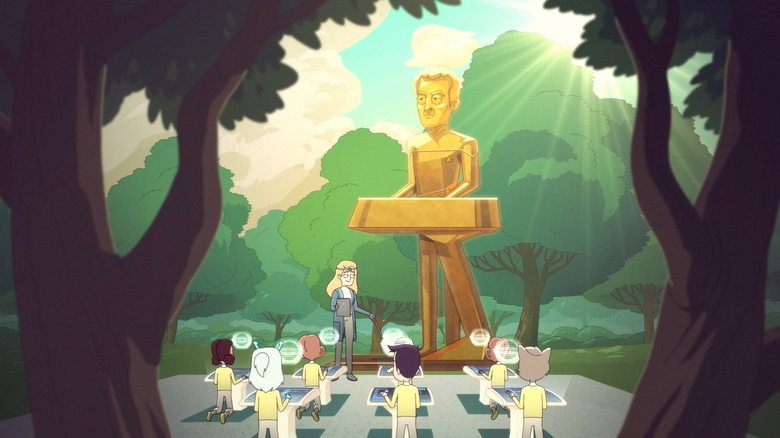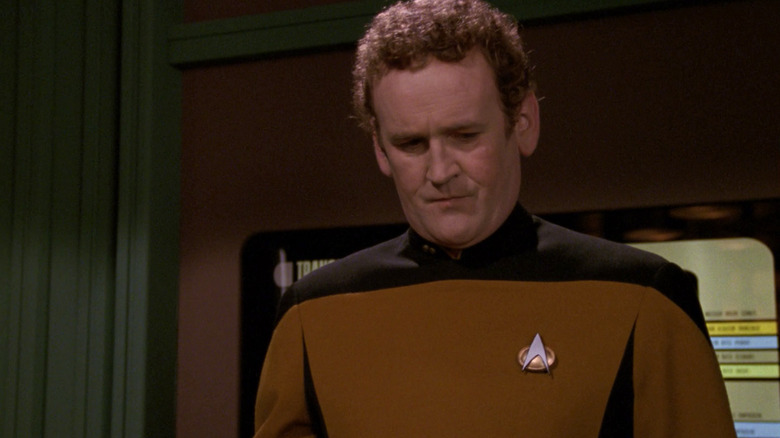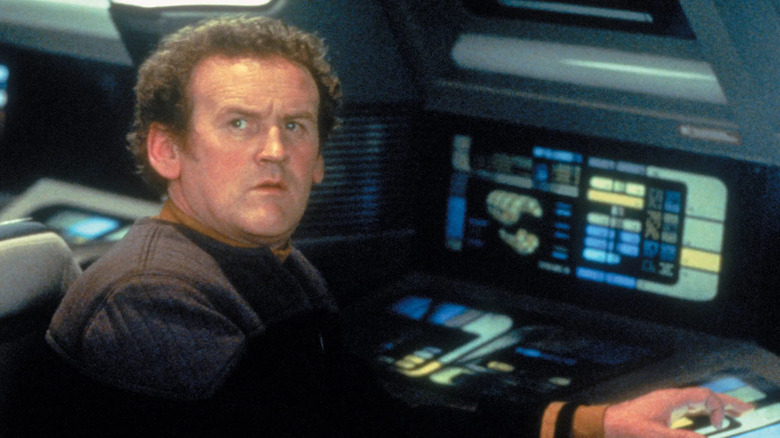Lower Decks Made Deep Space Nine's Miles O'Brien The Most Important Man In Star Trek History
In the third episode of "Star Trek: Lower Decks," titled "Temporal Edict" (August 20, 2020), the lower-ranking protagonists reveal a secret to each other that allows them to slack off as much as possible. It seems that whenever a superior officer tells them to do a task, the ensigns announce that it will take them four hours to complete. The task, however, usually only takes about 30 minutes. The remaining three-and-a-half hours can be used to relax. The ensigns refer to their cleverly built-in shirking as "buffer time." It seems "buffer time" is common among all the ensigns in Starfleet.
Sadly, through a slip of the tongue, buffer time is brought to the attention of the captain, Carol Freeman (Dawnn Lewis). Outraged by the slacking, she immediately implements an official countdown clock on her ensigns, forcing them to remain busy at all times. Tasks on the U.S.S. Cerritos are soon getting completed at a rapid rate, but the ensigns all begin to burn out.
When a crisis strikes, the ensigns are all too tired to be able to deal with it. It's the goody-goody, protocol-obsessed Ensign Boimler (Jack Quaid) who, panicked, suggests that relaxation time be worked back into the ensigns' schedules to allow them to stay alert. Captain Freeman agrees and announces how impressed she is by Boimler's strategized slacking off. Boimler, of course, always wanted to be seen as active and capable, so he is appalled that this is his legacy — one that is later cemented by an epilogue set in a classroom in the distant future. It seems, long after his death, statues will be erected in Boimler's honor, praising him as the laziest man in Starfleet.
Then, in a cute twist, the distant-future teacher states that Miles O'Brien is the most important man in history.
Miles O'Brien
Miles O'Brien (Colm Meany) appeared on multiple episodes of "Star Trek: The Next Generation" as a mere go-to transporter chief who beamed the main cast up and down from away missions. He was only a supporting character but was allowed more and more screen time as the show progressed. By the show's fourth season, Chief O'Brien was given entire subplots. All told, Chief O'Brien appeared in 52 episodes of "Next Generation." He was such a popular character that Miles eventually became the chief engineer on "Star Trek: Deep Space Nine," on which he would appear in 173 episodes. At the end of "Deep Space Nine," O'Brien had fine-tuned his engineering skills to such a degree that he was offered a professorship at Starfleet Academy.
Note that "Chief" is not an officer's rank. As an engineer, O'Brien is merely an enlisted man. He was on the Enterprise-D to repair machines and tinker with transporters. By the end of his run, he was a professor.
The makers of "Lower Decks," of course, noted the character's arc and wanted to pay it homage in "Temporal Edict." Indeed, the show's creator Mike McMahan told StarTrek.com in an interview that he felt O'Brien was actually one of the most important characters in the franchise, having shared a kinship with all ensigns everywhere. In his words:
"[W]hy did we put that statue at the end of the episode? If you ask the common fan on the street to name the most important 'Star Trek' character, they'll probably say Picard or Kirk. Us Lower Deckers would like to offer a different answer. [...] Chief O'Brien is the original Lower Decker, moving from an enlisted crewman all the way to professor of engineering at Starfleet Academy."
The most fully realized character in Star Trek
Chief O'Brien, in short, is the ultimate working stiff. He applied himself to the task in front of him and never displayed any ambition. Then, eventually, he was actually rewarded for his hard work. He rose in the ranks of Starfleet and got a cushy gig back on Earth. Additionally, the O'Briens were the only functional long-term romantic relationship depicted on "Star Trek," at least until the end of "Star Trek: Picard."
Mike McMahan saw everything that happened to O'Brien on "Star Trek" from 1987 to 1999 and saw a whole life. He wanted to make sure it was recognized within "Trek" canon as well. Hence, in the distant future, O'Brien will be given statues and endless admiration from all civilizations. McMahan explained:
"We experienced his full life in Starfleet — his marriage and relationship with Keiko, being a dad and moving up in rank and location, the dynamic between enlisted crew and officers through his friendships with Bashir and Sisko, and the trauma he experienced being a veteran of the Federation-Cardassian War. One could argue Miles O'Brien is the most fully realized character in 'Star Trek,' and we ask, no, demand he be given a statue."
For McMahan, this was all obvious, and he understood that other long-term Trekkies would agree. Was he a captain or a pseudo-Messiah? No, but he was a complete human being, and that's not nothing. "[T]hose of us who spent years watching him grow across two television series know he is, without a doubt, the most important person in Starfleet History," McMahan said. And really, there's not much to contradict that. Raise a glass of synthale to the working stiffs of "Star Trek." They deserve a toast.


